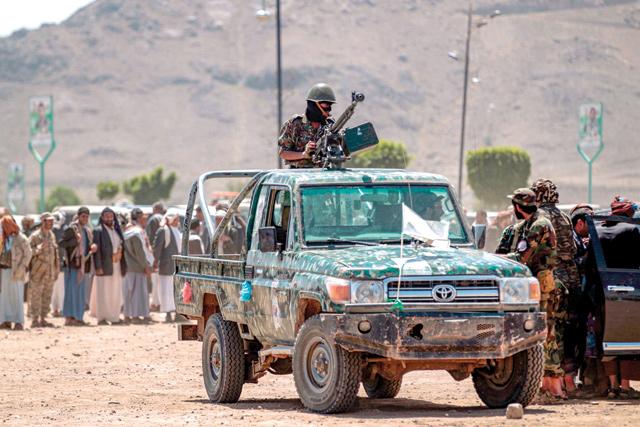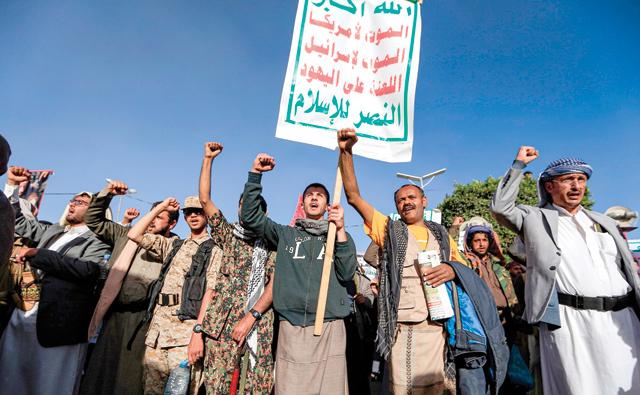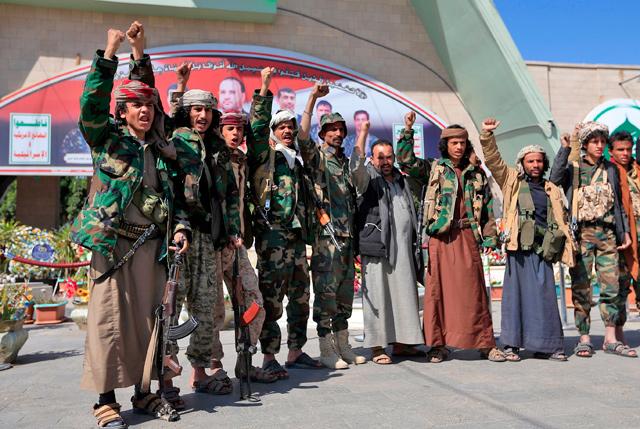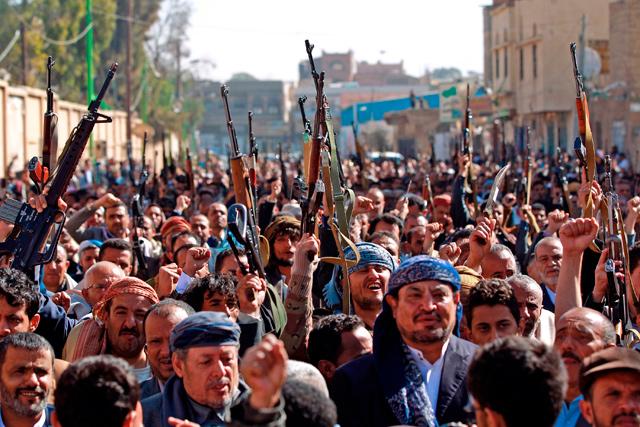You are here
Yemen's Houthis defiant as US brands rebels 'terrorists'
By AFP - Jan 11,2021 - Last updated at Jan 11,2021

In this file photo taken on September 21, 2019, a fighter loyal to Yemen's Houthi rebels mans a machine gun in the back of a pickup truck during a tribal meeting in the Houthi-held capital Sanaa, as tribes donate rations and funds to fighters loyal to the Houthis along the fronts (AFP photo)
SANAA — Yemen's Houthis were defiant Monday after the United States said it will designate the Iran-backed rebels as terrorists, a last-ditch move under President Donald Trump that aid groups warned could tip the country into famine.
Unless Congress blocks the decision, the Houthis will be blacklisted on January 19 — one day before the inauguration of President-elect Joe Biden, whose aides had hoped to mount a fresh push to end Yemen's devastating six-year-old war.
Houthi political commander Mohamed Ali Al Houthi in a tweet said the US move was "to be condemned, and we have the right to respond".
"The Yemeni people don't care about any designation from Trump's administration as it is a partner in killing Yemenis and starving them".
Iran's foreign ministry spokesman Saeed Khatibzadeh also condemned the US announcement and charged that "it's likely the bankrupt US government will do further damage to its reputation" in Trump's final days in office.
The decision announced by US Secretary of State Mike Pompeo could complicate Biden's promised efforts to restart diplomacy with Iran and to reassess Washington's alliance with Saudi Arabia, which has led a bloody offensive in its impoverished southern neighbour.
The designation aims to hold the rebel movement "accountable for its terrorist acts, including cross-border attacks threatening civilian populations, infrastructure and commercial shipping," Pompeo said Sunday.
The Houthis have "led a brutal campaign that has killed many people, continues to destabilise the region and denies Yemenis a peaceful solution to the conflict in their country".
The Yemeni government welcomed the announcement, saying the Houthis deserved it for their “continuous efforts to prolong the conflict and cause the world’s worst humanitarian crisis”.
Pompeo also designated as terrorists three leaders of the movement, including their chief Abdul Malik Al Houthi.
He pointed to a December 30 attack on an airport in Yemen’s second city Aden, which killed 26 people and was blamed by the Saudi-backed government on the Houthis.
Fears of aid groups
The Houthis control much of Yemen, including the capital Sanaa, and are already under US sanctions.
The designation is expected to scare away outside actors from many transactions with Houthi authorities, including bank transfers and buying food and fuel, for fear of US prosecution.
Aid groups have warned Pompeo against the blacklisting, saying they have no option but to deal with what is the de facto government in northern Yemen.
“The US government must ensure that any sanctions do not block food, fuel and medicines from entering a country already in the middle of a full-blown humanitarian catastrophe,” said the Norwegian Refugee Council.
Save the Children said thousands of children would be at greater risk of starvation and disease.
“This designation could directly threaten the supply of lifesaving food, fuel and medicine in Yemen, add obstacles to the humanitarian response, as well as hamper efforts to end the conflict, at a time when new data show that millions of people in the country are edging closer to famine,” the charity said.
Trump’s administration has ramped up pressure on Iran, hoping to make it more difficult for Biden to ease sanctions as he seeks a return to a nuclear deal.
US officials and analysts say Iran has armed the Houthis, but some experts question the extent of cooperation and see Tehran primarily as interested in bogging down Saudi Arabia, whose brutal air campaign has included strikes on civilian targets.
Tens of thousands of people, mostly civilians, have been killed and millions displaced in Yemen’s war, with most of the nation dependent on some form of aid to survive.
Analysts warn of disastrous consequences after the UN World Food Programme said in December that malnutrition had reached record levels, narrowing the window of opportunity to prevent a famine.
Peter Salisbury, senior Yemen analyst at the International Crisis Group, said the designation “risks collectively punishing all Yemenis by precipitating a famine while doing little to hurt the Houthis other than pushing them closer to Iran”.
“If the impact of this designation is half as bad as has been predicted it is millions of ordinary Yemenis who are struggling to eat who will pay the price, while already distant prospects of peace slip away.”
Congressional warnings
Under US law, Congress has seven days in which it can object to a designation of a foreign terrorist group.
But it will likely be focused on other issues, as the House of Representatives looks at impeaching Trump for a second time after he encouraged a mob that stormed the Capitol last week to disrupt a session that certified Biden’s election win.
Lawmakers from Biden’s Democratic Party had told Pompeo the designation would jeopardise both aid and peace efforts.
“This designation would almost certainly prevent the critical delivery of food, medical supplies and other items necessary to combat both COVID-19 and famine,” three senators said in a joint appeal last year.
In an open letter to Pompeo last month, retired US diplomats, including six former ambassadors to Yemen, also doubted that the Houthis met the legal definition of a terrorist group.
“Designating the Houthi movement will be perceived as politically motivated and will undermine the credibility of US counterterrorism programs and policies,” they wrote.
Related Articles
SANAA — Thousands of Yemen's Houthi rebels and their supporters protested in Sanaa on Monday after the US blacklisted the group as "terroris
DUBAI— Washington plans to designate Yemen's Iran-aligned Houthi rebels as "terrorists", but experts warn outgoing President Donald Trump's
SANAA — Hundreds of supporters of Yemen's Houthi rebels took to the streets of the capital Sanaa on Wednesday to protest against the US labe



















